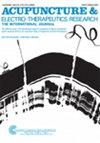针刺辅助治疗脑卒中后疲劳:系统回顾和荟萃分析
IF 0.4
4区 医学
Q4 INTEGRATIVE & COMPLEMENTARY MEDICINE
Acupuncture & Electro-Therapeutics Research
Pub Date : 2021-01-01
DOI:10.3727/036012921x16304136917645
引用次数: 0
摘要
本研究的目的是评估针灸结合康复治疗脑卒中后疲劳的有效性和安全性。本研究采用的方法如下:系统检索中国国家知识基础设施、中国科学期刊数据库、中国生物医学数据库、Cochrane图书馆、Medline和Embase,检索时间为成立至2020年12月。该数据集包括只有中文和英文的随机对照试验(RCTs),比较针灸作为中风患者疲劳康复的辅助手段。采用Cochrane偏倚风险评估工具对纳入试验的方法学质量进行评估。采用RevMan V.5.4软件进行统计分析。本研究共纳入6项rct,共纳入426例(治疗组213例,对照组213例)。meta分析结果显示,与常规治疗相比,针灸作为辅助治疗可显著降低脑卒中后疲劳发生率[MD = -5.45, 95% CI = (-6.75, -4.14), Z= 8.19 (P < 0.001)]。在能量方面,针灸也有明显的效果[MD = 1.69, 95% CI = (0.27, 3.12), Z = 2.33 (P < 0.02)]。我们的系统综述和荟萃分析表明,针灸联合常规康复治疗是治疗脑卒中后疲劳的有效方法,适合临床推广使用。然而,由于方法学上的缺陷和rct数量有限,结果应谨慎解释。需要进一步的大样本量和严格设计的临床试验。本文章由计算机程序翻译,如有差异,请以英文原文为准。
Acupuncture for the Adjunctive Therapy of Post-stoke Fatigue: A Systematic Review and Meta-analysis
The aim of this research is to assess the effectiveness and safety of acupuncture combined with rehabilitation therapy for post-stroke fatigue. The methods used in this research are as follows: systematically retrieving China National Knowledge Infrastructure, Chinese Scientific Journal Database, Chinese Biological Medicine Database, Cochrane Library, Medline and Embase were electronically searched from inception to Dec 2020. The dataset included randomized controlled trials (RCTs) with Chinese and English only that compared acupuncture as an adjunct to rehabilitation in stroke patients with fatigue. The methodological quality of the included trials was assessed using the Cochrane risk of bias assessment tool. Statistical analyses were performed by RevMan V.5.4.A total of 6 RCTs were included in this study, including 426 cases (213 cases in the treatment group and 213 cases in the control group). The results of meta-analysis showed that compared with conventional treatment, acupuncture as an adjuvant therapy can significantly reduce the incidence of post-stroke fatigue [MD = -5.45, 95% CI = (-6.75, -4.14), Z= 8.19 (P < 0.001)]. In terms of energy, acupuncture also has an obvious effect [MD = 1.69, 95% CI = (0.27, 3.12), Z = 2.33 (P < 0.02)]. Our systematic review and meta-analysis suggests that acupuncture combined with conventional rehabilitation therapy is an effective therapy for patients suffering from post-stroke fatigue, which is suitable for clinical promotion and use. However, due to methodological weakness and limited number of RCTs, the results should be interpreted cautiously. Further clinical trials with large sample sizes and a rigorous design are needed.
求助全文
通过发布文献求助,成功后即可免费获取论文全文。
去求助
来源期刊

Acupuncture & Electro-Therapeutics Research
医学-全科医学与补充医学
CiteScore
0.50
自引率
66.70%
发文量
9
审稿时长
>12 weeks
期刊介绍:
The aim of the journal is to provide an international forum for the exchange of ideas and promotion of basic and clinical research in acupuncture, electro-therapeutics, and related fields. The journal was established in order to make acupuncture and electro-therapeutics a universally acceptable branch of medicine through multidisciplinary research based on scientific disciplines. The final goal is to provide a better understanding of both the beneficial and adverse effects of these treatments in order to supplement or improve existing methods of diagnosis, prognosis, treatment, and prevention of diseases in both Western and Oriental medicine.
 求助内容:
求助内容: 应助结果提醒方式:
应助结果提醒方式:


